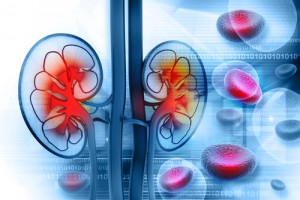The kidneys perform several life-sustaining functions:
- Cleanse your blood by removing waste and excess fluid
- Maintain the balance of water, sodium, potassium and phosphorus in your blood
- Produce renin, an enzyme which helps regulate blood pressure
- Produce a form of vitamin D, needed for healthy bones
According to the National Kidney Foundation, 1 in 3 Americans adults is at risk for kidney disease. You may be at risk for kidney disease if you have diabetes, high blood pressure or a family history of kidney failure.
Symptoms of Kidney Disease
When the kidneys become damaged, waste products and fluid can build up in the body, causing swelling in your ankles, vomiting, weakness, poor sleep and shortness of breath.
Types of Kidney Conditions
 Acute Renal Failure – the sudden loss of kidney function is called acute kidney injury, or acute renal failure (ARF). Common causes of acute renal failure could include a traumatic injury with blood loss, dehydration, sepsis, obstruction of urine flow, damage from drugs or toxins, or pregnancy complications such as eclampsia and pre-eclampsia.
Acute Renal Failure – the sudden loss of kidney function is called acute kidney injury, or acute renal failure (ARF). Common causes of acute renal failure could include a traumatic injury with blood loss, dehydration, sepsis, obstruction of urine flow, damage from drugs or toxins, or pregnancy complications such as eclampsia and pre-eclampsia.
Chronic Kidney Disease
Decreased kidney function and damage that lasts longer than 3 months is termed chronic kidney disease (CKD), or also chronic kidney failure. Chronic kidney disease can be serious because one may not have any symptoms until late, and often irreparable damage has occurred. Common causes of chronic kidney disease are diabetes and high blood pressure.
Effects of Kidney Disease
Without artificial filtering, or dialysis, chronic kidney disease can progress to end stage kidney failure and the diseased kidneys may stop functioning completely, which is potentially fatal.
Treatments for Kidney Disease
Treatment of chronic kidney disease is generally focused on slowing the progression of damage, by controlling the underlying issue causing the damage. For more serious kidney disease, dialysis or even a kidney transplant may be possible treatments.
